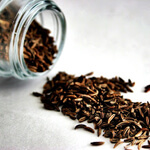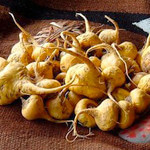 Caraway is a biennial plant that is native to Europe, Asia, and Northern Africa. It bears crescent-shaped brown seeds (which are technically fruits!) that possess a warm and peppery aroma, and are often used in rye bread, stews, potato dishes, soups, and liqueurs. These seeds have been treasured for centuries for their medicinal properties, and are becoming popular in the West as a dietary supplement due to their numerous health benefits.
Caraway is a biennial plant that is native to Europe, Asia, and Northern Africa. It bears crescent-shaped brown seeds (which are technically fruits!) that possess a warm and peppery aroma, and are often used in rye bread, stews, potato dishes, soups, and liqueurs. These seeds have been treasured for centuries for their medicinal properties, and are becoming popular in the West as a dietary supplement due to their numerous health benefits.
List of Health Benefits
Rich in fiber – One tablespoon (six grams) of caraway seeds provides us with an impressive two grams of dietary fiber, which is 10 percent of an adult’s recommended daily intake (RDI). Everyone knows that fiber is needed to improve regularity and treat constipation, but it also binds itself to toxins (including bile salts, which are made by cholesterol) and absorbs water from the intestine, resulting in a detoxifying effect that can prevent colon cancer.
Good source of fatty acids – One serving of caraway seeds provides us with 9.8 milligrams of omega-3 fatty acids, which have anti-inflammatory properties and can prevent heart disease, and 203 milligrams of omega-6 fatty acids, which support the skin and can lower cholesterol. We need to consume polyunsaturated fats regularly, since our body has limited storage for them.
Treatment for indigestion and flatulence – According to researchers, caraway seeds have properties that stimulate healthy stomach action and can help treat indigestion, intestinal gas, acid reflux, and other digestion-based conditions. The best way to avoid these conditions in the first place, however, is to avoid acidic foods and to eat slower and in smaller portions (eating from smaller plates can aid this transition).
Antioxidant activity – Caraway seeds are rich in flavonoids such as carotene, lutein, cryptoxanthin and zeaxanthin. Flavonoids are antioxidants that can help neutralize the cell-damaging effects of free radicals, thereby shielding us from degenerative diseases such as macular degeneration and even various cancers. Additionally, the seeds contain essential oils such as limonene, carvone, pinen, carveol, cumuninic aldehyde, and furfurol, which contain active principles that also possess antioxidant properties.
High in protein – Caraway seeds are comprised of approximately 20 percent protein, and contain a near-perfect amino acid profile. This makes them an excellent source of protein for vegetarians, vegans, and others who wish to avoid animal products. Protein is, of course, required for the growth, repair, and maintenance of all our body’s cells, as well as the production of antibodies.
Trace nutrient content – One serving of caraway seeds provides us with between one and six percent of our RDI of important trace minerals such as calcium, iron, magnesium, phosphorous, potassium, zinc, copper, manganese, and selenium. It also contains small amounts of vitamins C and E (both antioxidants), and numerous B-vitamins such as thiamin, riboflavin, and niacin.
Aside from the benefits listed above, caraway seeds also contain no cholesterol or sodium, and are low in calories, which makes them suitable as snacks. They also contain no glycemic index score at all (literally, zero), meaning that they have no impact on blood sugar levels and are suitable for diabetics and pre-diabetics.






